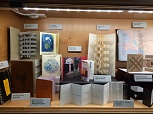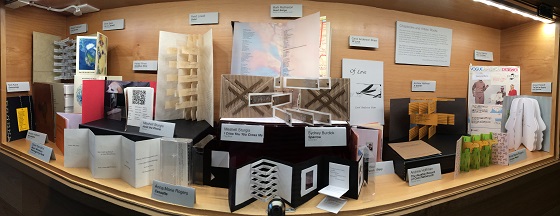Amaranth Borsuk exhibits student work in Discovery Hall

Visitors to Discovery Hall this summer can see chapbooks created by students in IAS faculty member Amaranth Borsuk's Spring 2016 "Advanced Interdisciplinary Arts workshop: Chapbooks and Artists' Books." The class asks what poets might learn from book artists about placing form and content in dialogue. Students learn a new binding each week, read a contemporary chapbook, and create one of their own. As a culmination to the quarter, each participant creates an editioned work to trade with their peers, and the class collaborates on a chapbook consisting of their strongest writing from the quarter.
The display case includes examples of a number of different bindings, including several excellent flag books, composed of thin interwoven strips of paper that can be read page by page or extended into an interlocking pattern. Reed Lowell's Babel, for instance, includes poems in a variety of historic and international poetic forms that, when extended, intersect with one another to form the bricks of the titular tower. Abi Pollokoff's Love Games intertwines the six stanzas of a single sestina to mimic the secrecy and strategy of a budding relationship. Andy Hoffman's Quarter uses the reverse side of the page, only revealed when the book is extended, to send secret x's and o's to a beloved at the other end of a payphone line. Hailey Priest's Goodbye Molly assembles a portrait of her beloved dog through word and image, and Anna Rogers' Love Poem takes a comic look at the way dogs find one another.
The display includes a number of other conceptually thoughtful works. Meshell Sturgis's X-book, Hold the Phone, folded from a single sheet of paper, acts as a memorial for Kedarie / Kandicee Johnson, a Black genderqueer youth murdered in Iowa this past March. Using the iPhone as a metaphor, it asks us to hold the weight of this lost life in our hands, to remember Johnson, and to consider the ways we are implicated in this loss. Ling Wan's My Family Story uses a dos-a-dos structure to place the three stages of her life–childhood, adolescence, and adulthood–back-to-back, visualizing how our relationship to our parents changes from dependence, to defiance, to devotion. Sydney Burdick's Sparrow, an accordion book, uses a number of intricate pop-up and cut-out forms to respond to a Rorschach inkblot. And Nicole Watkins' altered book Fast and Easy consists of naughty erasures from found sewing patterns that embrace the intersection of femme craft and sexuality.
The display also includes saddle stitched, stab bound, and perfect-bound books (made at Jik Ji studio on campus), as well as unbound books, all of which offer up text that interacts with its material form. Nick Kane's Entomology is a scrapbook of invented clippings that attempt to define "Kafkaesque." Carol Anderson's Of Love combines selections from her Master's thesis into a fragmentary book that plays with notions of containment and voyage. Mark Mathieson's Road Songs is a songbook interleaved with maps that considers the way music and language often guide us. In Moon Whiskey: Reimagining Hank, Dave Sanders distills the language of Hank Williams' songs into micro-poems that deal with love, loss, and liquor. And Chris Seko's Pocket Atlas(t) gives atlas images new titles that explore the perambulations of a new relationship.
These books represent a fraction of the work created by the class this past spring.
Please stop by Discovery Hall to see work by Sydney Burdick (CP), Andrew Hoffman (MFA), Shelby Hulbert (SEB), Nick Kane (CP), Reed Lowell (CLA), Mark Mathieson (ENST), Abigail Pollokoff (UW MFA), Hailey Priest (CLA), Anna Rogers (ENST), Dave Sanders (MFA), Christopher Seko (CLA), Carol Anderson Shaw (MFA), Meshell Sturgis (MACS), Ling Wan (MCS), and Nicole Watkins (MCS).

